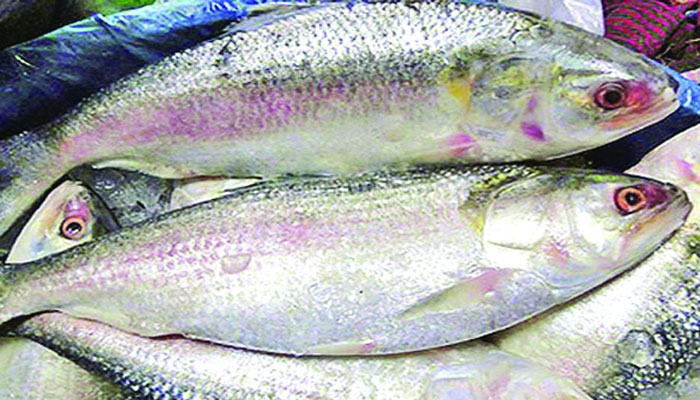Hilsha is not in the New Year! 1425
The late journalist Foyez Ahmad said that Pahla Boishakh has no relation with Panta and Hilsa. This is not the food of poor people. The people of the village buy hilsa and eat panta rice - it never saw, I did not hear. Each time it is debated before the year of the year. He was growing in the market with the price of Hilsa. The news of rising prices of Hilsa in the media for a few days has been reported by the recipes of Hilsa cooking recipes in Baishakh. But folk, cultural figures and fisheries experts have clarified that there is no relation between Pantha and Hilsa with Baishakh. It has become a commercially imposed culture. They say, eating hilsa in Baishakh is having adverse effects on the production of hilsa throughout the year.
For these reasons, the word 'Hilsa in the New Year' has been repeated repeatedly before the first Baishakh for two years. In the last two years, Prime Minister Sheikh Hasina dropped hilsa from the food list of Boishakhi organized at her official residence. On the first day of Baishakh, Hilsa-Panta had boycotted the activities of various socio-cultural organizations. This time the page has been opened for calling social media to eat hilsa in different places including Facebook. For two decades, the business of Panta-Hilsa has been wiped out in the New Year; Hilsa's house has reached the house of hundreds of thousands of houses.
On Thursday, various raw markets of the capital have seen that the hilsha procession in front of Pahela Boishakh is very busy. Customers complain that traders are selling Hilsa at a higher price than the festival. In the city's Karwan Bazar, Hilsa of 500-600 villages was sold at Tk 700-800, which was last month Rs 500-600. The price of Hilsa 800 to 900 grams of one thousand 100 to 300 thousand. The price of one kilo more than one kg is between Tk 1.5 and Tk 2,000. Hilsa is sold at almost the same price as in Karwan Bazar, Mirpur, Mohammadpur, Magbazar and other markets. As a result, the poor hilsa will remain in the hands of the people of limited income. In the city's super-shops, the price of hilsa has also risen. The price of one kg of hilsa in Meena Bazar is Tk 2,999. The price of small hilsa is Tk 550 per piece. The small size of the Hilsa is sold at the Dream Super Shop at 490 taka.
.jpg)
Suman Mia of Karwan Bazar said that the demand for hilsa has increased, so the wholesale price has also increased.
The director of the Eco Fisheries Project and Fisheries Researcher Professor Abdul Wahab told Samakal that the price at which the Hilsa is being sold is mainly for high and upper middle class people. But low-middle-class and low-income people can not afford to buy Therefore, if the Hilsa is to be made available to people of all classes throughout the year, then eating hilsa in Baishakh will stop eating. Any other fish or brewah can be eaten with Panta. And there is no relation with our culture.
Director of Bangla Academy and Bangla Academy Shamsuzzaman Khan said, Baishakh is the month of drought in real sense. There is no crop at this time. There is no money to buy hilsa for the common farmer. As a result, hilsha is not added to pontoon. In fact, the first Boishakh was organized in rural Bengal, the rice cooked on the previous day. The rice water that the farmer used to eat and sprinkle Kisheni for Mars. They used to eat pentamara, onion, onion, dessert, and eggplants.
Poet ashad Chowdhury speaks against Panta-Hilsa for the first time in Pahela Baishak He said that Hilsha is part of our tradition. However, Panta-Hilsa is not part of Bengali culture in any way. During this time, when the preservation of the Hilsa, the hilsa was stopped. Now catching eggs, Jatka hilsa is being caught. Eating an egg means eating many fish.
